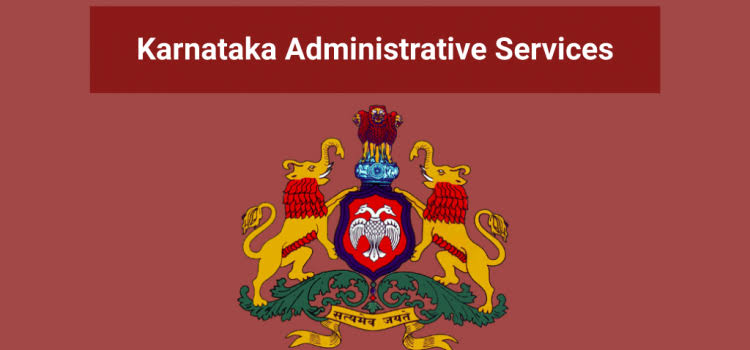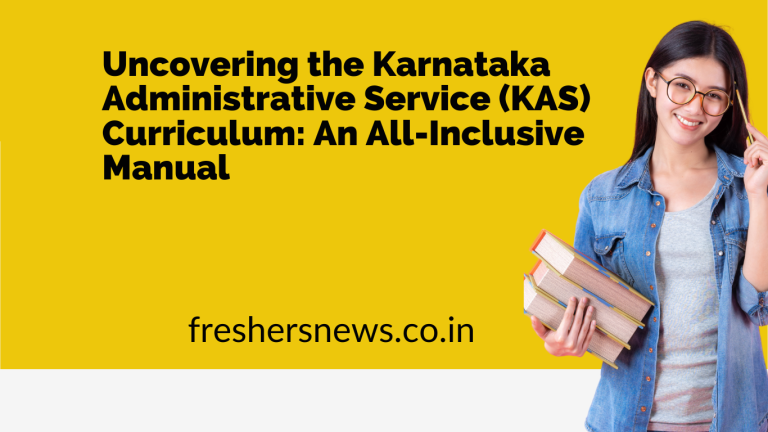Introduction
The Karnataka Public Service Commission (KPSC) administers the esteemed Karnataka Administrative Service (KAS) test. It’s seemed as one of the most coveted checks for Karnataka applicants hoping to get into the kingdom civil carrier. The Karnataka country government administers the KAS exam which will pick out candidates for a number of administrative positions. One need to have a thorough comprehension of the fabric and examination layout for you to bypass this exam. We shall look at the KAS examination’s complete syllabus on this put up, going over each subject matter and all of its subtopics in element. Here we are talking about Uncovering the Karnataka Administrative Service (KAS) Curriculum: An All-Inclusive Manual.
Here we are discussing about Uncovering the Karnataka Administrative Service (KAS) Curriculum: An All-Inclusive Manual :

Overview of the KAS Exam
Let’s take a look at the KAS examination’s structure earlier than delving into the syllabus. The KAS assessment is performed in three ranges
1. Preliminary Exam: This is an goal-fashion assessment.
2. Main Examination: Descriptive papers are used in this written exam segment.
3. Personality Test (Interview): Those who pass the number one exam are invited to an interview, additionally called a persona check.
Let’s now examine every degree’s syllabus in more detail:
Preliminary Examination
There are two papers inside the initial exam:
Paper 1: General Studies-I
Paper II: Civil Services Aptitude Test (CSAT) – General Studies-II
General Studies I Paper I:
This exam ambitions to assess the candidate’s standard information and recognition of modern affairs, each locally and globally, as well as their know-how in trendy science, Indian records, Indian and global geography, Indian politics and governance, monetary and social improvement, environmental ecology, and preferred and Indian geography.
Paper 1 Syllabus:
| 1. Current Events of National and International topics | Events within the fields of politics, economics, technology, sports, and lifestyle which might be of countrywide and international discussion |
| 2. India’s History: | Prehistoric History: Vedic Era, Mauryan and Gupta Empires, Indus Valley Civilization, and many others. Medieval History: Mughal Empire, Vijayanagara Empire, Delhi Sultanate, etc. Modern History: Indian Independence Movement, British Rule in India, India After Independence, and so forth. |
| 3.Geographical components of India and the world | It encompass bodily, social, and economic factors. Covers up the entire geographical knowledge that need to be known by the aspirant |
| 4. Indian Politics and Governance | – Indian Constitution, Preamble, State Policy Directives, fundamental rights of citizen and many others – Indian Public Policy, Governance, and Political system. |
| 5. Economic and social improvement | It covers up the Indian economy, social sector projects, poverty, unemployment for youngsters, and monetary reforms, amongst other matters. |
| 6. Environmental Ecology | – Environmental pollutants, biodiversity, weather exchange, ecology and environment, and many others. |
| 7. General Science | Environmental Science, Biology, Chemistry, and Physics |
| 8. Mental Ability | – Decision-Making, Problem-Solving, Data Interpretation, Reasoning and Analytical Ability, etc. |
General Studies-II (CSAT) Paper II:
General Studies-II, additionally known as the CSAT, is the second one preliminary exam paper that assesses a candidate’s understanding, communique, logical reasoning, analytical capability, choice-making, hassle-fixing, primary numeracy, and statistics interpretation.
Plan of Study for Paper II:
| 1. Comprehension | Questions primarily based on comprehension passages so practice and prepare yourself according to that. |
| 2. Communication and different interpersonal abilties | Communication is the most important factor which help to clear the interview, together with the capability to recognize and cope with issues in verbal exchange. |
| 3. Analytical Ability and Logical Reasoning | Fundamental comprehension and analytical software of ideas including critical thinking, logical reasoning, and many others. |
| 4. Making Decisions and Solving Issues | – Problem-fixing and decision-making questions designed to evaluate a candidate’s aptitude for scenario analysis and choice-making. |
| 5. General Mental Ability | Questions approximately visual memory, problem-solving, analysis, judgment, choice-making, and area visualization, among other things. |
| 6. Fundamental Numeracy | – Relationships between numbers, value order, and so on. |
| 7. Data Interpretation | – Tables, graphs, charts, and the adequacy and so on |
Principal Analysis:
There are nine papers in the exam , seven of them are compulsory, and two are optional papers.
Compulsory exams:
Paper I:
Kannada: This examination measures the candidate’s proficiency in the language in terms of reading, writing, and comprehension. Without this candidate cannot cleat the KAS exam
Paper II:
English: This exam measures the candidate’s English abilties and should have same proficiency as to the Kannada exam.
Paper III:
General Studies-I: This paper covers topics like records, international geography, and society, as well as Indian historical past and lifestyle.
Paper IV:
General Studies-II: This paper addresses public management, governance, and the Indian Constitution.
Paper V:
General Studies-III: This paper is targeted at the surroundings, catastrophe control, financial improvement, biodiversity, generation, and protection.
General Studies-IV
Paper VI: This paper checks flair, ethics, and integrity.
Paper VII:
Optional subject matter Paper-I: From the list provided with the aid of KPSC, applicants can also choose one elective subject matter.
Papers on elective topics:
Applicants must select one non-obligatory route from the KPSC-supplied list of topics. History, geography, political technological know-how, sociology, public administration, commerce, psychology, agriculture, and other publications are a number of the most popular electives.
Interview-based totally personality check:
Those who bypass the primary exam are invited to the Personality Test (Interview). The candidate’s expertise, character, and suitability for administrative offerings are evaluated through the interview panel.
FAQS
What is the KAS exam?
To fill a whole lot of administrative positions in the Karnataka nation government, the Karnataka Public Service Commission (KPSC) administers the Karnataka Administrative Service (KAS) examination.
What are the KAS exam ranges?
There are three stages to the KAS exam:
Preliminary Examination
Main Exam
Interview/Personality Test
What is the KAS Preliminary Examination syllabus?
The following is included within the initial examination syllabus:
General Education-I
The Civil Services Aptitude Test, or CSAT, is General Studies II.
The KAS Main Exam includes how many papers?
There are nine papers inside the main test; seven of them are required, and are optional.
Which papers are required for the KAS Main Exam?
The required readings are:
Paper 1: Kannada
Paper II: English
Paper III: General Studies I
Paper IV, General Studies, Part II
Paper V: General Studies III
Paper VI: General Studies, IV.
Paper I: Optional Subject (Paper VII)
What topics are covered in the KAS Main Examination optional papers?
From a list of elective topics supplied with the aid of KPSC, applicants may additionally pick one. History, geography, political technology, sociology, public management, commerce, psychology, agriculture, and so on are a few common electives.
How can I get geared up for the KAS check?
Comprehend the syllabus in its entirety.
Create a take a look at schedule and follow it.
Read the endorsed books and take a look at courses for every situation.
Practice with beyond yr’s examination questions and sample assessments.
Concentrate on huge knowledge and contemporary activities.
Boost your verbal exchange and writing competencies in practise for the main test.
Keep abreast on each home and worldwide happenings.
Does the KAS Preliminary Examination have bad marking?
Indeed, the initial examination has bad marking. A 1/3 of the marks allotted to that query are subtracted for each wrong response.
What is the weightage of the optionally available situation in the KAS Main Examination?
A considerable amount of weight is assigned to the optional concern inside the primary examination. To do properly on this paper, applicants ought to cautiously don’t forget and put together their optionally available subject.
How good sized is the KAS examination interview segment?
The interview section, every so often referred to as the Personality Test, is an vital evaluation of the candidate’s understanding, character, and suitability for administrative services. It is essential to the technique of making the remaining decision.
CONCLUSION
The KAS examination is quite competitive and necessitates big have a look at. The first step to passing this take a look at is to understand the syllabus. To do properly on both the preliminary and main tests, applicants have to focus on laying a solid basis in every topic and exercise regularly. It is possible to bypass the KAS exam and land a activity inside the Karnataka Administrative Service with commitment, effort, and careful planning

